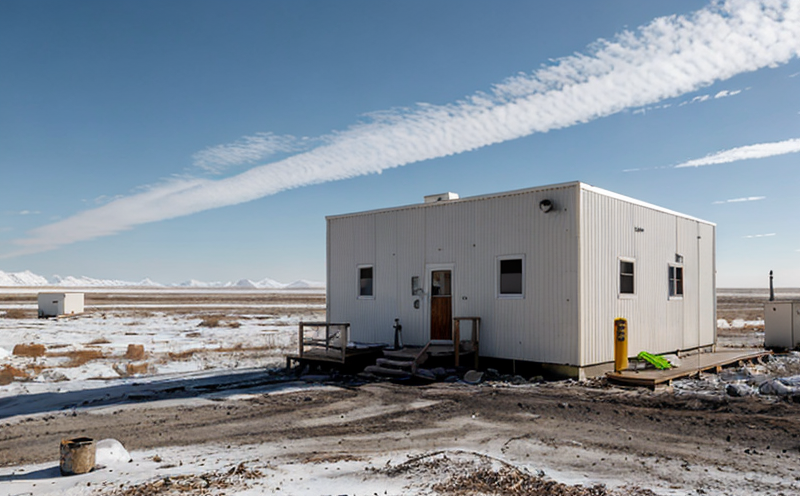JEDEC JEP151 Radiation Hardness Assurance Testing
The JEDEC JEP151 standard is a critical requirement in the semiconductor and microchip testing sector, designed to ensure that electronic components can withstand exposure to ionizing radiation. This test plays a pivotal role in aerospace, defense, medical, and space industries where components must function reliably under harsh environmental conditions.
The process of JEP151 testing involves exposing semiconductor devices to high levels of gamma or X-ray radiation. The goal is to simulate the kind of radiation environments that these devices might encounter during their operational lifecycle, such as in satellites orbiting Earth or in aircraft flying at high altitudes where cosmic rays are more prevalent.
During JEP151 testing, engineers carefully select and prepare samples according to specific criteria outlined by the standard. The specimens undergo rigorous thermal cycling before exposure to radiation to ensure they can handle both temperature variations and ionizing radiation simultaneously. Once prepared, these components are placed in a controlled environment where they are subjected to high-intensity gamma or X-ray beams.
The testing apparatus used for JEP151 is sophisticated and includes radiation sources capable of delivering consistent doses of radiation at specified rates. The test setup also features temperature control units that maintain precise thermal conditions, ensuring accurate simulation of real-world scenarios. After exposure to the radiation field, engineers meticulously inspect the samples for any signs of degradation or failure.
The acceptance criteria for JEP151 testing are stringent and vary based on the specific application and the type of device being tested. For instance, in aerospace applications, the devices must demonstrate robustness against high-energy particles like neutrons and protons. In medical contexts, they need to maintain functionality under similar radiation conditions without compromising safety or efficacy.
The detailed reports generated from JEP151 testing provide comprehensive insights into how well the device performs after exposure to ionizing radiation. These reports are essential for quality managers, compliance officers, and R&D engineers who rely on them to make informed decisions about product reliability and safety. The data can also be used during procurement processes to ensure that only high-quality components are selected.
The JEP151 standard is part of a broader suite of testing protocols designed for the semiconductor and microchip industry, which includes other tests such as thermal cycling and vibration testing. However, its unique focus on radiation hardness makes it indispensable in sectors where reliability under extreme conditions is paramount.
Benefits
The benefits of JEDEC JEP151 Radiation Hardness Assurance Testing extend beyond mere compliance with industry standards; they offer substantial advantages to manufacturers and end-users alike. By ensuring that components can withstand harsh radiation environments, this testing helps prevent costly failures in critical systems.
- Enhanced reliability: Ensures components function correctly even after exposure to ionizing radiation, which is crucial for mission-critical applications.
- Improved product longevity: Helps extend the operational life of devices by identifying potential weaknesses early on during development and manufacturing processes.
- Cost savings: By reducing the risk of field failures, companies can save on warranty claims and service costs associated with repairing or replacing faulty components.
- Enhanced reputation: Demonstrating adherence to rigorous testing standards like JEP151 enhances a company's credibility in the competitive electronics market.
Industry Applications
The JEDEC JEP151 Radiation Hardness Assurance Testing finds applications across various industries, particularly those that demand high levels of reliability and safety. Here are some key sectors where this testing is essential:
- Aerospace: Ensures spacecraft electronics can operate reliably in space, where they face constant radiation exposure.
- Medical Devices: Guarantees the integrity of medical devices used in environments that require stringent regulatory compliance.
- Defense: Supports the development of military-grade electronics capable of withstanding extreme conditions on the battlefield.
- Space Exploration: Facilitates the creation of equipment for space missions, ensuring components can survive the rigors of deep space travel.
Why Choose This Test
Choosing JEDEC JEP151 Radiation Hardness Assurance Testing is a strategic decision that offers numerous advantages. Here’s why it stands out:
- Comprehensive Coverage: Tests cover all aspects of radiation hardness, ensuring comprehensive analysis.
- Standardized Process: Adherence to internationally recognized standards ensures consistency and reliability.
- Precision: Advanced testing equipment guarantees precise results that are crucial for accurate assessment.
- Cost-Effective: Early identification of potential issues through rigorous testing can save significant costs in the long run.





